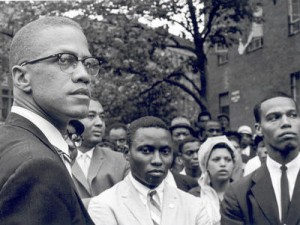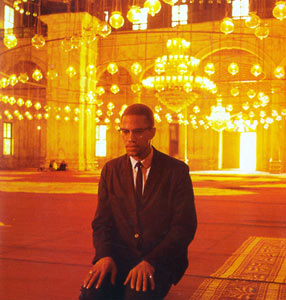“Any time I have a religion that won’t let me fight for my people, I say to hell with that religion. That’s why I am a Muslim.” — Malcolm X
The Nation of Islam was founded in 1931 by Wallace D Fard. Fard presented himself as a Muslim prophet and preached a message of “black redemption within Islam.” He claimed “the Asiatic Black Man” had been the original inhabitant of the earth. The white race had been given 6,000 years to rule and eventually whites and white Christianity would be destroyed. Elijah Muhammad, who became leader of the Nation of Islam after Fard disappeared, developed this idea further. He claimed, originally, that the black race had inhabited the moon and that at one time the moon and earth were one. A black scientist, called Yakub, supposedly caused an explosion that separated the two. The first people to inhabit the earth were members of a black tribe called Shabazz. While these notions may seem fanciful, they are no more so than the Christian story of Adam and Eve and the Garden of Eden. And yet, white Christianity, in all its permutations, has been developed over centuries, and it has been used to justify slavery, racism and imperialism. It is a religion that the ruling class needed and continues to uphold.
The attraction of the Nation of Islam to blacks was its apparent ability to voice the anger and discontent that existed in every black community. In terms of rhetoric, the Nation of Islam were among the strongest advocates of black pride but their separatist outlook and refusal to actively engage in the civil rights struggle left them spectating from the sidelines of the movement. They produced proud books on black history. Discarding their surnames as marks of their slave past, they replaced them with the suffix “X.” Converts had to follow a strict code of discipline – no pork, tobacco, alcohol, drugs or extra-marital sex. Engagement in political activity with non-Muslims was not permitted. Until their demand for a separate state was met, Muslims were to have no social, political or religious contact with whites. They demanded self-determination in the form of either an independent black state in America or a return to Africa.
As Marxists, Socialist Alternative would argue that this separatist policy is fundamentally flawed. We believe that the sustained division of the working class along racial lines will greatly weaken the potential of the struggle against capitalism. It aids the efforts of the ruling class to keep various communities within the working class divided and fighting among themselves instead of uniting against their common exploiters. It was to keep black and white workers divided that the ruling class created and cultivated organizations like the Ku Klux Klan.
While holding this position, we do not arrogantly condemn blacks attracted to nationalist ideas. We would support the right to self-determination for any nation, but we also have a duty to point out that, under the capitalist system, a separate black state is unrealistic. We need only look to Zionism – the establishment of Israel on a capitalist basis – to illustrate the point Israel is no safe haven for Jews. It is an armed camp for US imperialism. The creation of a separate black state in America would pose even more difficulties. By the l960s, blacks did not make up the majority in any one state like they had during slavery. Two in three blacks had moved to cities in the north and south in search of jobs. So, for a black nation to be created, tens of millions of blacks and whites would have to be forcibly uprooted.
Black nationalism is not black racism. Of course, taken to ludicrous extremes, it can be thoroughly reactionary. Louis Farrakhan today uses Black Nationalism to try to justify black capitalism. Malcolm X as a leader of the Nation of Islam met with the Ku Klux Klan to discuss ways of ensuring separatism. However many ordinary blacks who conclude that there is no road out of this capitalist system turn to the ideas of separatism. The job of Marxists is not to dismiss blacks drawn to these conclusions, but to show that struggle for a socialist revolution is the only true road to black liberation.
 From initially having just a few hundred supporters, the Black Muslims grew to 100,000 members by the early 1960s. The liberation struggles sweeping Africa and Asia at the time undoubtedly affected blacks in the US. Racial pride grew among the whole of the black population. It was on the tide of this new wave of confidence that the Nation of Islam was able to grow. Malcolm X was one of their foremost ministers; his oratory skills attracted a new section of youth toward the religion. Even the media and press hyped up the Black Muslims. A section of the ruling class recognized that they would eventually be forced to make concessions to the black masses of America. They deliberately portrayed the Nation of Islam as the nasty, vicious side of the black movement, thus bolstering the respectable, non-violent mainstream of Martin Luther King.
From initially having just a few hundred supporters, the Black Muslims grew to 100,000 members by the early 1960s. The liberation struggles sweeping Africa and Asia at the time undoubtedly affected blacks in the US. Racial pride grew among the whole of the black population. It was on the tide of this new wave of confidence that the Nation of Islam was able to grow. Malcolm X was one of their foremost ministers; his oratory skills attracted a new section of youth toward the religion. Even the media and press hyped up the Black Muslims. A section of the ruling class recognized that they would eventually be forced to make concessions to the black masses of America. They deliberately portrayed the Nation of Islam as the nasty, vicious side of the black movement, thus bolstering the respectable, non-violent mainstream of Martin Luther King.
It was a conscious strategy of the Nation of Islam to target prisons as a recruitment ground. This can be traced back to 1942 when Elijah Muhammad and 62 of his followers were convicted of draft evasion (their religion does not allow them to serve in the armed forces) and jailed for three years. While in prison Muhammad recognized the fertile ground that existed for any radical ideas among what was known as the black underclass. After the war, much time and energy was devoted specifically to winning over prisoners.
But to many, the Black Muslims were rife with contradictions. It wasn’t enough for them to simply attack white society and preach black unity. In the early 1960s demonstrations, sit-ins, and marches swept almost every state. At a time when militant blacks were involved in mass action the Nation did not do anything to build the growing civil rights movement. They would attack the strategy of the mainstream civil rights movement and yet offer no alternative struggle outside the confines of their own organization.
 Malcolm X became a popular leader of the Nation. He threw himself into his work and into the black community. He was catapulted to fame in the press. Much more able than Elijah Muhammad to connect with the growing protest movement of young blacks, he became frustrated by the restraints of the organization. When he eventually split with them in 1964 he said: “If I harbored any personal disappointment whatsoever, it was that privately I was convinced that our Nation of Islam could be an even greater force in the black man’s overall struggle if we engaged in more action. It could be heard increasingly in the Negro communities, ‘Those Muslims talk tough, but they never do anything.'” Although the eventual split was put down to “internal differences,” there is no doubt that his desire to politically organize blacks in action was an important factor. At his first press conference after the split Malcolm still defended the Nation, Elijah Muhammad, and their “back to Africa” policy. But he did say: “Separation back to Africa is a long term program and, while it is yet to materialize, 22 million of our people who are still here in America need better food, clothing, housing and jobs right now… Now that I have more independence of action, I intend to use a more flexible approach toward working with others to get a solution to this problem.”
Malcolm X became a popular leader of the Nation. He threw himself into his work and into the black community. He was catapulted to fame in the press. Much more able than Elijah Muhammad to connect with the growing protest movement of young blacks, he became frustrated by the restraints of the organization. When he eventually split with them in 1964 he said: “If I harbored any personal disappointment whatsoever, it was that privately I was convinced that our Nation of Islam could be an even greater force in the black man’s overall struggle if we engaged in more action. It could be heard increasingly in the Negro communities, ‘Those Muslims talk tough, but they never do anything.'” Although the eventual split was put down to “internal differences,” there is no doubt that his desire to politically organize blacks in action was an important factor. At his first press conference after the split Malcolm still defended the Nation, Elijah Muhammad, and their “back to Africa” policy. But he did say: “Separation back to Africa is a long term program and, while it is yet to materialize, 22 million of our people who are still here in America need better food, clothing, housing and jobs right now… Now that I have more independence of action, I intend to use a more flexible approach toward working with others to get a solution to this problem.”

